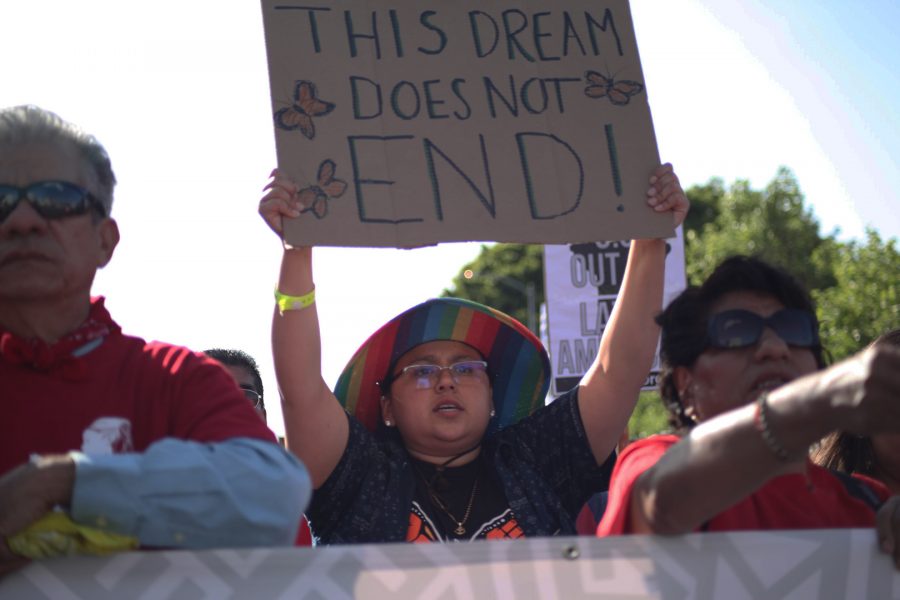As COVID-19 travels across international lines, the unnerving feeling of uncertainty begins to settle into our daily routines. But some communities see this as an unwanted bonus to the already growing problems they face as an adversary to their only way of life. With issues such as green cards, work visas and DACA applications, life as an undocumented citizen is hard enough without the extra burdens of a full blown pandemic in the mix.
It is quickly becoming more difficult to live undocumented as the coronavirus spreads. California became the state with the third most confirmed cases at 3,172, according to Johns Hopkins University.
On March 15, Los Angeles Mayor Eric Garcetti took to the press in an unusually quiet press conference— almost completely digital in an attempt to follow social distancing guidelines. Garcetti announced that he had signed an order preventing people from gathering in close proximity by closing bars and nightclubs and preventing restaurants from allowing customers to dine in, instead encouraging them to only take curbside, pickup or delivery orders. The order also closed movie theaters, entertainment venues, arcades and gyms, effective at midnight that night.
According to the Pew Research Center, there are more than 5 million undocumented workers in the United States. Of them, more than 700,000 work in restaurants and the food industry.
California community colleges serve the largest number of undocumented students within the state, and it is easy to see how precautions that are meant to cull the spread of the virus are harming the community. Besides money problems from lack of work, another major problem undocumented students in particular face is the renewal of their Deferred Action for Childhood Arrivals, or DACA, applications.
DACA applications must be renewed every two years, allowing for people with an unlawful presence in the United States after being brought over as children to receive a two year period of deferred action in the U.S. and become eligible to receive a work permit as well as financial student aid.
The problem is this: with immigration centers announcing a temporary shutdown until at least April 1, DACA recipients who need to renew their DACA are left with little options and high risk of losing their work permits and jobs if it expires. Sagrario Eusebio, a Mt. SAC DREAM student, is currently in fear of missing her deadline.
“My sister and I need to renew our DACA. Everything is closed and I don’t know if I will be able to renew in time,” she said, knowing that if it expires, she won’t be able to work or go to school. “I really don’t know what will happen but I would like for an extension to renew our DACA.”
Antonio Solorio, another Mt. SAC student, expressed concern that he or his family would get sick. Besides his problems with asthma already compromising his lungs, he fears that hospitals would check for citizenship status, as well as his restaurant job cutting his hours or downstaffing.
With the problems faced by the undocumented community at Mt. SAC being seen clear as day, the issue is that there is no clear answer for how long things will remain this way.
Amid all, the most active threat would be the U.S. Immigration and Customs Enforcement ICE raids. Unlike many businesses and government offices which aim to keep in-person meetings off the table, ICE has decided to increase surveillance and arrest efforts throughout the quarantine period, with reports of arrests across the country as families hunker down at home.
Activist and organizer Karla Estrada said that this is disgusting, yet typical.
“This shows that the administration doesn’t care about immigrants,” Estrada said. “They don’t care about immigrants or about their own officers, this puts everybody at risk.” Estrada said that she would compile a list of available resources on her Instagram account, @karla_estrada_222.
The Mt. SAC DREAM program sent out an email on March 18, notifying students that that counseling appointments, which will be scheduled through email, will still be available over the phone. Also shared in the email was a list of internet providers offering free internet to students and a Google document created by a coalition of Los Angeles County organizations with food, housing, transportation and other resources that can be found here. The program also asked DACA recipients who are in need of renewal to fill out this online form, which would allow DREAM to reach out and guide students through the legal process.


